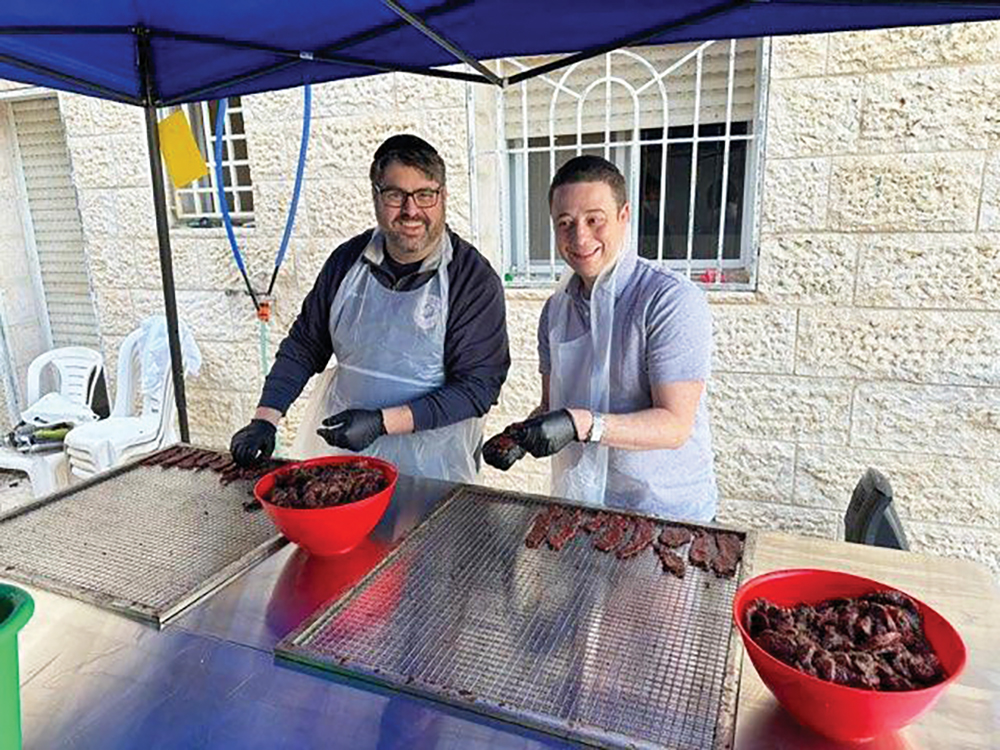
The warfront in Israel has required many different types of resources. Many who aren’t fighting are trying to help by donating these resources and assisting in their distribution. One such campaign is that of making and distributing beef jerky to the soldiers.
Beef jerky is a dehydrated strip of meat that is salted and marinated. It’s a portable but filling snack, contains high levels of protein and has a stable shelf life, even after the package has been opened. JJ Lewis, a reserve soldier currently stationed near Gaza said, “Its high protein staves off hunger for a while, and its spicy flavor wakes you up. The chew lasts for a while and keeps you going. It’s perfect for long days outside.”
Chaim Rutenberg, a resident of Beit Shemesh, realized the benefits of this snack during the first week of the war, and has created an umbrella initiative, “Beef Up Our Boys.” This initiative seeks to collect beef jerky and to make as much as possible in order to distribute to soldiers in Israel.
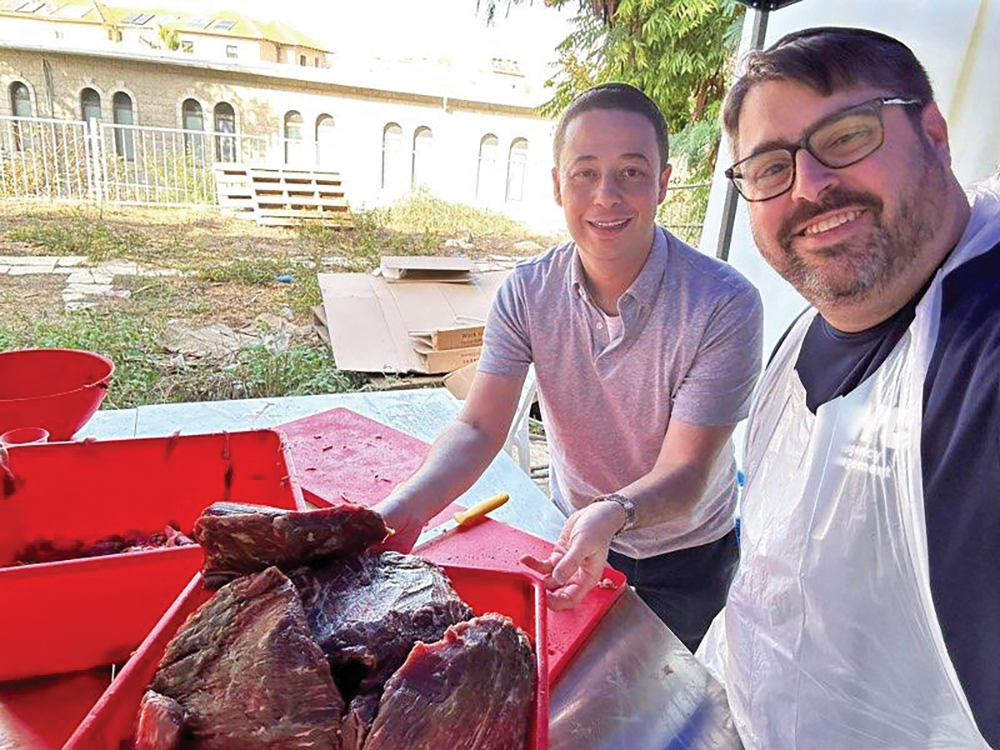
Rutenberg made aliyah 10 years ago, and was hosting his newly married nephew on Simchat Torah, when the war broke out. His nephew was called up to serve, and Rutenberg’s new niece stayed with them. Ruteneberg felt how “gut-wrenching” it was to watch a newlywed have to leave his wife to go to war, and how upsetting it was that they couldn’t even hear from his nephew for several days. When they finally did hear from him, he expressed that he was constantly hungry.
Rutenberg, like many around him, was doing all that he could to volunteer to help the war effort—cleaning up in Hadassah Hospital, delivering supplies at all hours to various army bases and responding to the many WhatsApp groups that were asking for assistance.
Rutenberg and others were starting to realize that beef jerky could help with the problems of hunger on bases and in battles. He began reaching out to butchers around Israel, asked shuls to create WhatsApp groups and started his own fundraising page to collect this pricey food. And he was successful. People responded. Butchers donated and got sponsors for the beef jerky, and shuls and WhatsApp groups collected funds.
The word spread to America. Butchers such as “Meat and Board” in Lakewood, New Jersey, sent suitcases of beef jerky; the Chabad from Providence, Rhode Island, sent duffels of cod jerky and portobello jerky (for vegetarian soldiers); and Rutenberg was able to start delivering large amounts of beef jerky to many bases around Israel. However, by this point, requests for thousands of packages were flowing in every day.
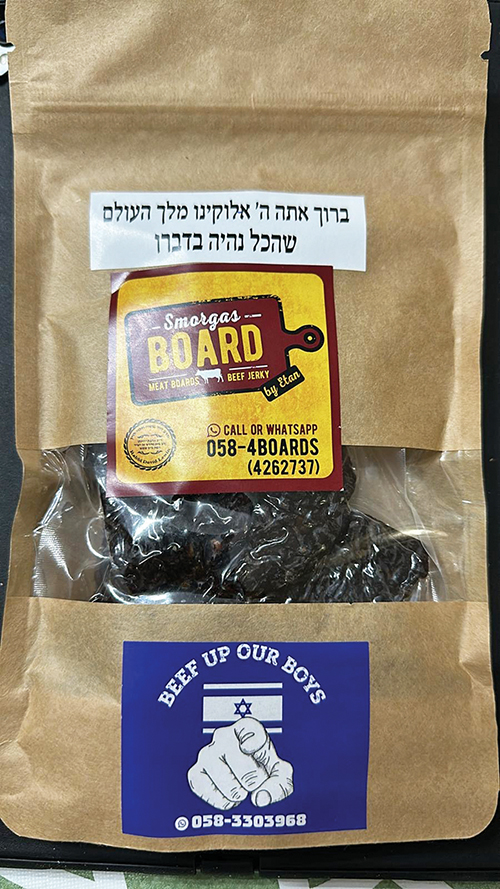
Rutenberg decided to hire a group of people in Beit Shemesh to stop their usual work and spend their time making beef jerky—around the clock. The yeshiva boys from Reishit Yerushalayim were the first to volunteer, but they were by no means the last. Volunteers started coming from all over Israel, and eventually even Americans from abroad, who came to Israel specifically to help with the war effort, contributed to the jerky-making process. Rutenberg explains, “In this time of tragedy and great difficulty, when you’re not doing something, you’re depressed. But when you’re doing something, you’re not depressed.”
Jeffrey Remin, who made aliyah in 2022, went to volunteer and help make jerky with his friend Sruli Tannenbaum from Riverdale, who had come to Israel to volunteer. They were amazed at the process. Remin explained that marinating beef jerky usually takes 12 hours, but in this Beit Shemesh kitchen they acquired a machine that can do it in 45 minutes. As volunteers, Remin’s and Tannenabum’s job was to cut the brisket, trim off any fat, rub down each piece, and lay it on the dryer when ready.
Tannenbaum was so touched by this “tangible way to support the chayalim” that he is now spreading the word around Riverdale, hoping to get more people involved.
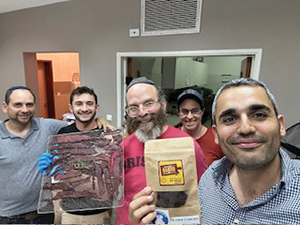
The Beit Shemesh team making the beef jerky soon decided that every sealed box would get a sticker on it with the bracha “shehakol nihyeh bidvaro” and then a second sticker with the logo “Beef Up Our Boys.”
People from all walks of life have helped with the jerky initiative. Israeli children have delivered letters to the soldiers to be included inside the boxes, artisanal chefs have come to help out some days and a marketing executive came to share marketing strategies.
Rutenberg added, “Whenever parents of a soldier come to me to request beef jerky, it’s never only for their one son. It’s always for their son’s entire unit. It’s a universal feeling of “We have to feed the boys.” And to fuel a soldier fighting in a war—it’s like fueling a tank.”
Rutenberg shared a specific text message from a soldier: “We were running after terrorists in the field. We were out of breath. Then I remembered I had [beef jerky] in my pouch. [We ate it] and it gave us the strength to keep going.”
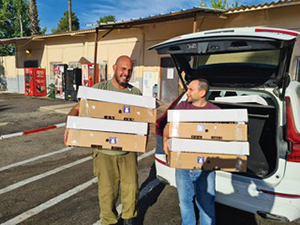
Rutenberg explains that his whole initiative began because he loves his nephew, and couldn’t stand the idea of him being hungry in the war. But so many others wanted to use their energy to help. “I was brought up to do. Do! The Lubavitcher Rebbe has a quote that many have used in the past weeks. It says, ‘When you’re in the dark, make light.’ And that’s what the people are doing. You can feel the engine of doing here. It’s unbelievable.”
To donate, go to “Beef Up Our Boys” online. To volunteer, leave a comment on the site with your contact information.










